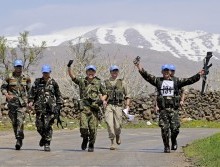Following the release of United Nations peacekeepers who had been held by Syrian opposition forces, Germany’s foreign minister has pointed to the incident as proof the Syrian civil war is a threat beyond the country’s borders. In a statement released by his office, Guido Westerwelle on Saturday expressed relief that the UN personnel had arrived safely into Jordan.
Despite that sentiment, he also highlighted the disturbing impact the Syrian conflict is having overall. “The events of the past few days have shown that the civil war in Syria is extremely dangerous not only for the UN observers, but for the entire region,” said Westerwelle.
“We will continue to support the people in Syria, but we absolutely must avoid a situation where the civil war in Syria spills over its borders and into neighboring countries and the region as a whole.”
The UN peacekeepers, part of the force observing the ceasefire between Syria and Israel along the Golan Heights region, were detained by “armed elements of the Syrian opposition” last Wednesday, according to a report by the UN News Centre.
The US State Department last week said they understood that the “Martyrs of Yarmouk” battalion was the opposition group holding the peacekeepers. US spokesperson Victoria Nuland said in comments released by the State Department last Thursday that the group had said it did not intend to harm the peacekeepers.
The US and Germany both condemned the actions of the opposition elements. “We condemn in the strongest terms the taking of neutral UN personnel as hostages,” said Westerwelle. “The work of the United Nations on the border between Israel and Syria in the Golan Heights is very important and must continue.”
The Syrian Observatory for Human Rights (SOHR) reported on its Facebook page last Friday that an agreement had been reached to release the peacekeepers. According to the SOHR, “A precondition to the release of the hostages is that the area should witness a ceasefire, with regime forces stopping their bombardment.”
(By Joshua Spurlock, www.themideastupdate.com, March 11, 2013)

